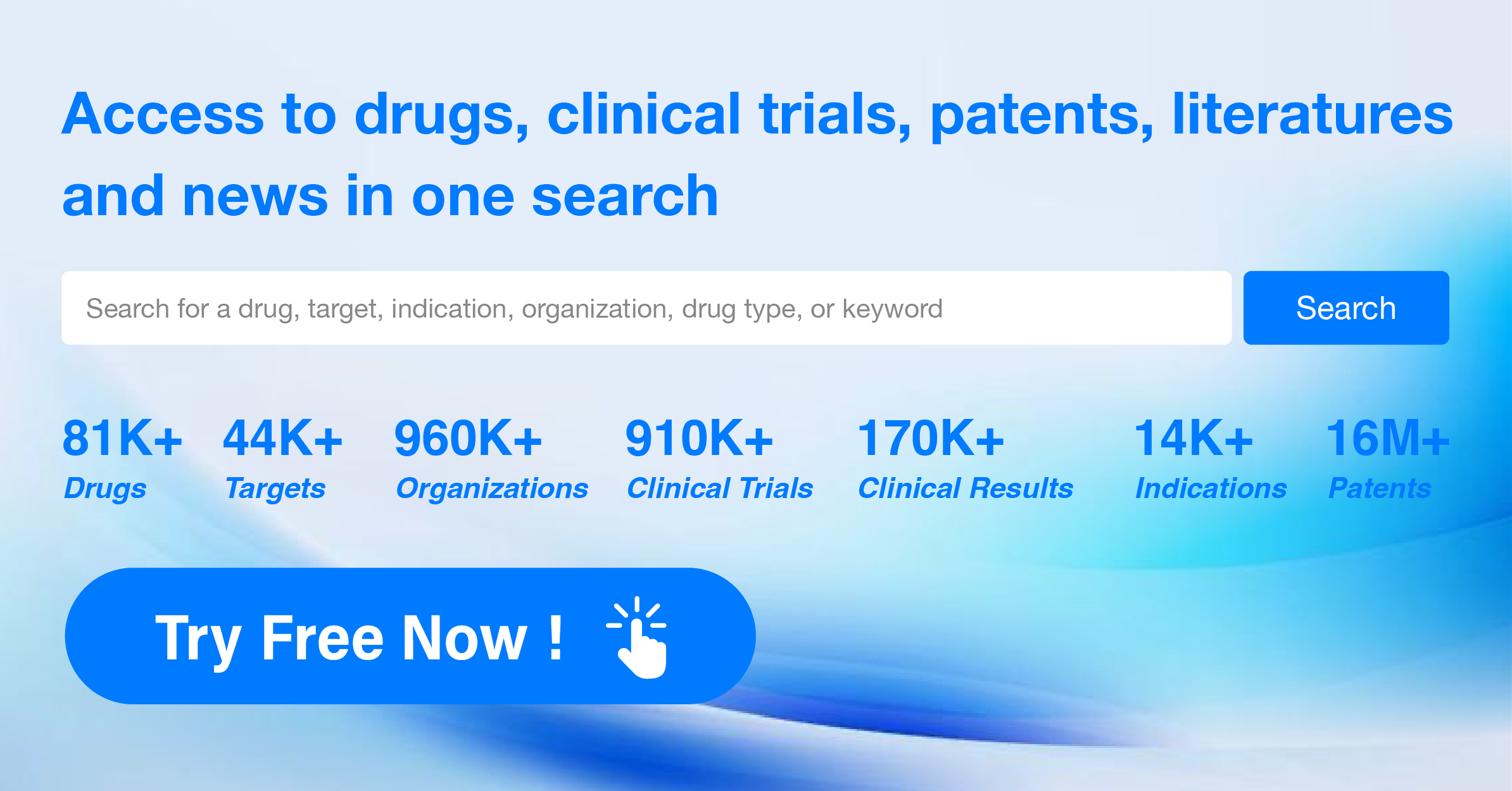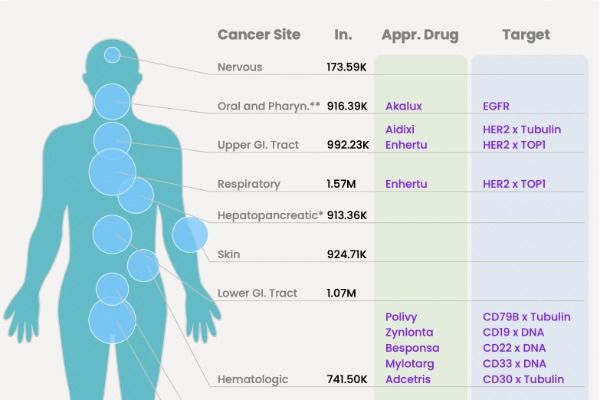Pharma Frontiers: Daily Digest of Global Pharmaceutical News - April 25
1.Small Molecule Inhibitor Ojemda That Crosses the Blood-Brain Barrier Granted Accelerated Approval by the FDA
On April 24th, the U.S. FDA announced the accelerated approval of the pan-RAF kinase inhibitor Ojemda (tovorafenib), developed by Day One Biopharmaceuticals, for the treatment of recurrent or refractory pediatric low-grade glioma (pLGG) in patients aged 6 months and older who have BRAF fusions or rearrangements, or a BRAF V600 mutation. According to a press release from the FDA, this is the first time the FDA has approved a systemic therapy for the treatment of pediatric low-grade glioma patients carrying BRAF rearrangements, including fusions. Pediatric low-grade gliomas are the most common brain tumors in children, accounting for approximately 30-50% of all central nervous system tumors. In patients with pLGG, BRAF gene fusion is the most common cancer-driving factor. Currently approved BRAF inhibitors are only active against tumors harboring the BRAF V600 mutation and have limited activity in brain tumors, and cannot be used in patients with BRAF fusion. Tovorafenib is a highly specific pan-RAF kinase inhibitor capable of inhibiting the growth of tumors carrying either BRAF fusion or BRAF V600 mutation and possesses brain penetrance. Tovorafenib has been designated by the US FDA as a breakthrough therapy and received an orphan designation for pediatric diseases, for the treatment of pLGG with activating RAF mutations. The FDA’s approval of tovorafenib was primarily based on data from the Phase 2 clinical trial FIREFLY-1. FIREFLY-1 aimed to evaluate the efficacy and safety of tovorafenib as a once-a-week monotherapy in patients aged 6 months to 25 years with recurrent or progressive pLGG harboring activating BRAF mutations. Safety and tolerability analyses indicated that tovorafenib, as a single agent, was generally well tolerated.
2.Astellas' enzalutamide gains new approval from the European Union, reducing the risk of cancer spreading or death by 58%!
On April 24, Astellas announced that the European Commission (EC) has approved a new indication for enzalutamide (brand name Xtandi) for marketing authorization. It is approved as a monotherapy or combined with androgen deprivation therapy (ADT) for adult men with high-risk biochemical recurrence (BCR) of non-metastatic hormone-sensitive prostate cancer (nmHSPC) who are not suitable candidates for salvage radiation therapy. This approval expands the indications for the product to include the treatment of recurrent early-stage prostate cancer. This indication for enzalutamide was previously approved by the US FDA in November 2023. In nmHSPC patients, conventional radiological methods do not detect evidence of cancer spreading to distant parts of the body, and the cancer still responds to drugs or surgeries aimed at lowering levels of testicular hormones. In men who have undergone radical prostatectomy, radiation therapy, or both, it is estimated that 20-40% will experience BCR within 10 years. Approximately 90% of high-risk BCR patients will progress to metastatic disease, and one-third will die from metastatic prostate cancer. Enzalutamide is an androgen receptor (AR) signaling inhibitor that not only blocks the binding of androgens to their receptors but also inhibits the transfer of the receptor to the cell nucleus, as well as the binding of the androgen receptor to DNA. Therefore, it acts not only as an antagonist of the androgen receptor but also inhibits the androgen signaling pathway. Enzalutamide had already been approved in the EU for treating three different forms of advanced prostate cancer (non-metastatic castration-resistant, metastatic castration-resistant, and metastatic hormone-sensitive prostate cancer). The current approval for treating high-risk BCR nmHSPC extends the approved indications to include the treatment of recurrent early-stage prostate cancer.
3.BeiGene's anti-PD-1 monoclonal antibody approved in the EU for three lung cancer indications
On April 23, BeiGene announced that the European Commission (EC) has approved Tislelizumab for first and second-line treatment of three non-small cell lung cancer (NSCLC) indications. This marks the second approval for Tislelizumab in the region. Tislelizumab is a specially designed humanized IgG4 anti-PD-1 monoclonal antibody. The product has already been approved in the United States and the European Union for the treatment of patients with advanced or metastatic esophageal squamous cell carcinoma (ESCC) who have previously received chemotherapy. Additionally, Tislelizumab is under review by the European Medicines Agency (EMA) and FDA for the first-line treatment of unresectable, recurrent, locally advanced, or metastatic ESCC, as well as for the first-line treatment of patients with gastric or gastroesophageal junction adenocarcinoma. The indications approved by the European Commission for Tislelizumab are as follows: in combination with paclitaxel and carboplatin or nanoparticle albumin-bound paclitaxel and carboplatin for the first-line treatment of adults with locally advanced or metastatic squamous NSCLC who are not suitable for surgical resection or platinum-based chemoradiotherapy; in combination with pemetrexed and platinum-based chemotherapy for the first-line treatment of adults with non-squamous NSCLC with PD-L1 expression ≥50% and without epidermal growth factor receptor (EGFR) or anaplastic lymphoma kinase (ALK) positive mutations, who are not suitable for surgical resection or platinum-based chemoradiotherapy; and as a single agent for the treatment of adults with locally advanced or metastatic NSCLC who have previously received platinum-based chemotherapy. Patients with NSCLC positive for EGFR mutations or ALK mutations should have previously received targeted therapy before administering Tislelizumab. According to a BeiGene press release, the EC's approval was based on the results of three Phase 3 RATIONALE clinical studies, which enrolled a total of 1,499 patients. These studies demonstrated the benefit of Tislelizumab for patients with newly diagnosed and relapsed non-small cell lung cancer.
4.A potential "first-in-class" small molecule therapy achieves Phase 2 clinical endpoint, significantly alleviating symptoms of depression
On April 23, Neurocrine Biosciences announced positive top-line data from the Phase 2 clinical trial SAVITRI for its investigational therapy NBI-1065845 in treating Major Depressive Disorder (MDD) in adult patients. NBI-1065845 is a potential "first-in-class" AMPA receptor positive allosteric modulator (PAM), designed to treat MDD patients who have had an inadequate response to at least one antidepressant medication during a depressive episode. The study successfully met its primary endpoint and key secondary endpoints. NBI-1065845 demonstrated statistically significant improvements on the Montgomery-Asberg Depression Rating Scale (MADRS) total scores at both day 28 (primary endpoint) and day 56 (secondary endpoint). The least squares (LS) mean differences in MADRS total scores for NBI-1065845 were as follows: one dosage improved by -4.3 (p=0.0159) and -7.5 (p=0.0016) at day 28 and day 56 respectively compared to placebo. Another dosage showed improvement trends, with changes of -3.0 (p=0.0873) and -3.6 (p=0.1082) at day 28 and day 56 respectively. The tolerability profile of NBI-1065845 was generally good, with headache being the most common adverse event. The incidence of adverse events for both dosages was comparable to that of the placebo group. There were no reports of deaths or serious adverse events during the study, and the discontinuation rate remained low throughout. Further data from the SAVITRI study will be presented at upcoming scientific conferences.
5.Akeso Biopharma's PD-1/CTLA-4 bispecific antibody, Cadonilimab injection, files for new indication approval for marketing
On April 24th, the website of the Center for Drug Evaluation (CDE) under the National Medical Products Administration (NMPA) of China displayed that Akeso Biopharma's self-developed PD-1/CTLA-4 bispecific antibody, Cadonilimab injection, has been accepted for a new indication filing. According to a press release from Akeso Biopharma, this is the third market application for an indication of Cadonilimab, proposing its use in the first-line treatment of persistent, recurrent, or metastatic cervical cancer both with and without platinum-based chemotherapy combined with or without bevacizumab, compared to placebo with the same chemotherapy regimen. Cadonilimab is an indigenous PD-1/CTLA-4 dual-specificity tumor immunotherapy drug developed by Akeso Biopharma. In June 2022, Cadonilimab was approved by China's NMPA for marketing as a monotherapy for platinum-based chemotherapy-failed recurrent or metastatic cervical cancer. In January 2024, Cadonilimab's application for a new indication for first-line treatment of advanced gastric cancer in combination with standard treatment protocols was also accepted by the CDE. The acceptance of this new indication application for Cadonilimab in the first-line treatment of advanced cervical cancer is based on the AK104-303 study. The AK104-303 study is a phase III randomized, double-blind controlled clinical trial using Cadonilimab with or without platinum-based chemotherapy combined with or without bevacizumab for the first-line treatment of persistent, recurrent, or metastatic cervical cancer. The primary endpoints of the study are progression-free survival (PFS) and overall survival (OS), evaluated by independent central imaging review (BICR) based on RECIST v1.1 criteria.
6.Hemei Pharmaceutical has filed for the market approval of its PDE4 inhibitor Mufemilast, intended for the treatment of plaque psoriasis.
On April 24, the website of the Center for Drug Evaluation (CDE) indicated that Hemei Pharmaceutical submitted a marketing application for Mufemilast (Hemay005). The application is presumed to be for the indication of plaque psoriasis based on the progress of clinical trials. Mufemilast is a small molecule inhibitor targeting phosphodiesterase 4 (PDE4), developed by Hemei Pharmaceutical. PDE4 modulates the production of various inflammatory mediators by regulating intracellular levels of cAMP and/or cGMP, thus, PDE4-targeted therapies are effective in treating various inflammatory disorders. Mufemilast entered clinical trials for the first time in December 2016. To date, Hemei Pharmaceutical has conducted two Phase III clinical trials of this drug for indications including plaque psoriasis and Behcet's disease. In November 2023, Hemei Pharmaceutical presented the Phase II results of Mufemilast for the treatment of Behcet's disease at the American College of Rheumatology (ACR) conference. The study, a multicenter, randomized, double-blind, placebo-controlled clinical trial (n=90), evaluated the efficacy and safety of Mufemilast (45/60mg, twice daily) compared to placebo in treating patients with Behcet's disease. The Full Analysis Set (FAS) results demonstrated that Mufemilast at doses of 60mg (one-sided, P<0.0001) and 45mg (one-sided, P<0.0001) significantly outperformed placebo in reducing the number of oral ulcers. The median healing time for oral ulcers was estimated using the Kaplan-Meier method: 16 days for the 45mg group, and 15 days for the 60mg group, while the median healing time for the placebo group could not be estimated by this method. In the safety dataset (patients who received at least one dose of the drug or placebo), treatment-emergent adverse events (TEAEs) related to the study drug led to discontinuation in 6.9% of the 45mg group and 6.7% of the 60mg group, both rates being higher than that in the placebo group (0.0%). Most reported TEAEs during the 12-week core treatment period were mild.
7.Filing for Market Authorization of Desidustat, a Small-Molecule Inhibitor Developed Based on Nobel Prize-Winning Research
On April 23, Kangzhe Pharmaceutical announced that its New Drug Application (NDA) for Desidustat tablets was accepted by the National Medical Products Administration (NMPA) of China on April 22. Desidustat tablets are an innovative oral Hypoxia-Inducible Factor Prolyl Hydroxylase Inhibitor (HIF-PHI) intended for the treatment of anemia in adult chronic kidney disease (CKD) patients who are not on dialysis. According to the "Chinese Expert Consensus on Diagnosis and Treatment of Renal Anemia" (2018 Revised Edition), anemia is a common complication of CKD. However, the treatment standard achievement rate, i.e., achieving the target hemoglobin (Hb) levels (110-120g/L), is only 8.2% for non-dialysis CKD patients, highlighting a significant unmet treatment need. Healthy kidneys naturally secrete erythropoietin (EPO), a hormone that stimulates the production of red blood cells. In CKD patients, renal function progressively declines, eventually leading to renal failure. If renal function is impaired, the kidneys produce lower levels or cease to produce EPO, thus leading to anemia. HIF-PHI works by increasing the production of endogenous erythropoietin, improving iron utilization, and reducing hepcidin levels to promote red blood cell production. Research on the HIF oxygen-sensing pathway was awarded the Nobel Prize in Physiology or Medicine in 2019. Desidustat is an innovative oral HIF-PHI, which was previously approved for marketing in India. In January 2020, a wholly-owned subsidiary of Kangzhe Pharmaceutical acquired exclusive licensing rights for Desidustat in China from Zydus Lifesciences. As an oral medication, Desidustat is expected to improve patient compliance and potentially meet the unmet treatment needs in the field of CKD anemia, including both dialysis and non-dialysis patients.
8.Incyte Acquires Escient, Securing Two Potential "First-in-Class" Small Molecule Therapies EP262 and EP547
On April 24th, Incyte and Escient Pharmaceuticals announced a definitive agreement wherein Incyte agreed to acquire Escient for approximately $750 million, thus securing two potential "first-in-class" small molecule therapies, EP262 and EP547. This acquisition will support Incyte's expansion of its research and development pipeline in the inflammation and autoimmune disease sectors. Escient Pharmaceuticals is a clinical-stage company focused on developing novel therapies to treat a variety of neurosensory inflammation diseases. The company’s product line includes two potential "first-in-class" small molecule antagonists, EP262 and EP547. EP262 is a potent, highly selective once-daily small molecule antagonist of MRGPRX2, a receptor expressed on mast cells that can be activated by various ligands released from sensory neurons and other cell types. By blocking MRGPRX2 and the release of mast cell granules, EP262 has the potential to treat various mast cell-mediated diseases, including atopic dermatitis (AD), chronic inducible urticaria (CIndU), and chronic spontaneous urticaria (CSU). EP547 is a potent, highly selective small molecule antagonist of MRGPRX4, which could block the activation of MRGPRX4 by various bile acids, bilirubin, and biliverdin, and shows promise as a potential effective therapy for cholestatic and uremic pruritus. According to the terms of the agreement, Incyte will acquire Escient and its assets for $750 million, with the transaction expected to be completed before the third quarter of 2024.




